Leptin resistance is a major and seriously underappreciated cause of weight loss resistance and weight gain.
The good news is that there are many ways to treat this condition which is very common among obese people.
The bad news is that your doctor isn’t likely to know much about it which leaves it up to you.
In this article, you will learn about the various prescription medications which are available to use to treat leptin resistance, how they work, and the potential pros and cons of each.
The Problem with Most Weight Loss Medications
We are going to focus primarily on medications that reduce insulin levels directly or sensitize your body to leptin.
And this is important because leptin, especially leptin resistance, is one of the main drivers of obesity.
I would go as far as to say that all obese patients have some element of leptin resistance.
Some would argue that the primary driver behind obesity is calorie intake and others would say it’s insulin resistance.
While both of these have some truth, I really believe that leptin is probably a stronger driver present in all forms of obesity.
Why is this the case?
Because
So how does this relate to prescription medications?
Well, it turns out that all of the ‘good’ weight loss medications are probably medications you have never heard of.
The reason is simple:
Most weight loss medications target your appetite and attempt to reduce the number of calories that you are consuming.
But, as I said previously, this is a component of weight gain but it’s not the main problem found in obese patients.
Furthermore, reducing your calories tends to only help for a short period of time (it will help with short-term weight loss) but we know that about 97-99% of people who lose weight through this method will eventually gain it back (1) (2) (3).
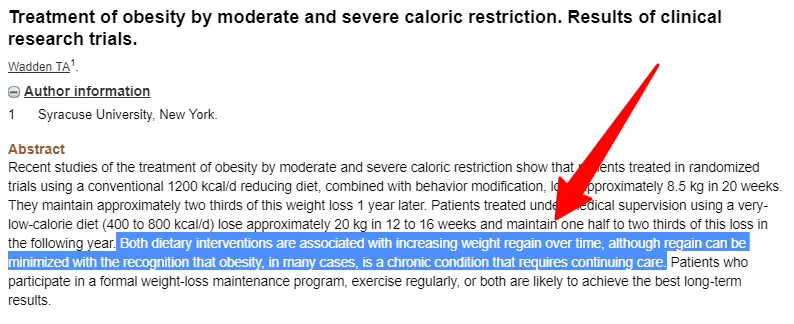
So the problem with most weight loss medications is that they target the wrong pathway!
Instead of focusing on appetite, they should be focusing on balancing leptin levels (which may mean increasing or decreasing leptin depending on the situation).
Below you will find a list of prescription medications (yes, they will require a prescription) that can be used to target and reverse leptin resistance.
The net effect should be an improvement in your weight which will stay long-term.
These medications are NOT listed in order of potency, so pay no mind to the order you find them in.
#1. GLP-1 Agonists
Perhaps one of the most well-known class of drugs that can be used to treat leptin resistance is the GLP-1 agonists.
GLP-1 agonists are short for glucagon-like peptide agonists.
These medications are not typically used to treat leptin resistance but are instead FDA-approved to treat diabetes (type II).
One of these medications, Saxenda, is FDA approved for weight loss but the others are not.
They were created with the intent to treat diabetes but it was later found that they also have a profound effect on weight.
Most researchers believe that the reason they help with weight loss is that they suppress the appetite.
And while that may be true, these medications also have an effect on both leptin sensitivity and insulin sensitivity.
And it is the effect on these hormones which makes them so valuable, especially for leptin resistance.
We know from many studies that leptin levels need to be high for your body to lose weight.
But after you lose weight your leptin level will fall.
It is hypothesized that this drop in leptin after weight loss is one of the primary drivers of weight gain following weight loss and why so many people are unsuccessful at long-term weight loss.
GLP-1 agonists seem to help prevent that drop in leptin seen in the post-weight loss timeframe (4).
So they help keep your leptin level high which helps you not only keep your weight off but also helps promote continued weight loss over time.
This is probably the biggest benefit that I see when using these medications.
They help people that have a lot of weight to lose get lose weight at a slow and steady pace but the benefit is that they keep it off (unlike virtually every other diet program out there).
In addition to this, they also help promote leptin sensitivity (5).
This improved sensitivity could be mediated directly through its effects on the cells or indirectly through its effects on insulin resistance and weight loss.
It’s hard to say and no one knows for sure, but it appears to have a double effect on leptin.
One major problem in using GLP-1 agonists for leptin resistance is that they must be used off-label for this purpose.
This also makes it difficult to get a prescription from your doctor who may have no idea how GLP-1 agonists affect leptin and other hormone systems.
Doctors tend to have a one-track mind and getting them to step out of their comfort zone can be difficult.
To further complicate this picture is the fact that GLP-1 agonists tend to be very expensive and insurance companies don’t like to pay for them even though they are incredibly effective.
Medications like Saxenda, which are approved for weight loss, can cost upwards of $1,000 per month!
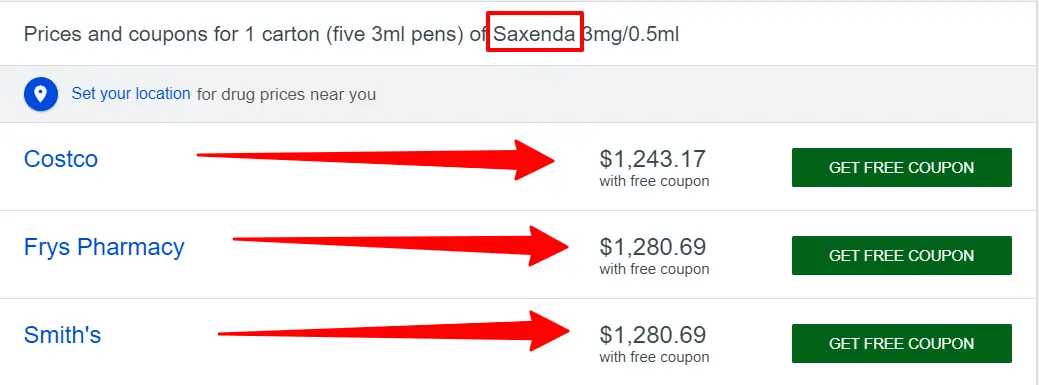
The sad truth is that if these medications were 1/10th of that price so many people would be helped and more money would be saved from the weight that would be shed.
There are some tricks that you can use to get your insurance company to pay for the medication but they will require that your doctor is willing to work with you and jump through some hoops.
You might also be able to use a coupon code to help offset the price of the medication but these coupons don’t always work.
Medications that are technically classified as GLP-1 agonists include:
#2. Metformin
Ahh, Metformin is one medication that you are probably very familiar with.
Most doctors, due to their comfort with this particular medication, will hand it out to people for all sorts of issues.
The most common, though, is for the treatment of diabetes and pre-diabetes.
Metformin is a very old medication and is considered the first-line medication for early insulin resistance.
Some in the anti-aging community also recommend using it to prolong lifespan (6).
So it’s clear that metformin has multiple benefits and several of which we probably haven’t yet discovered.
Relative to our discussion, though, is the fact that metformin does seem to have an impact on leptin levels.
There have been several studies that show that the use of metformin can help decrease leptin levels (7).
This decrease in leptin is very helpful if you are someone who has leptin resistance and needs to lower your leptin level temporarily to help promote sensitivity (8).
It can also help improve insulin resistance (which is another common cause of obesity) which may also be why it affects leptin levels.
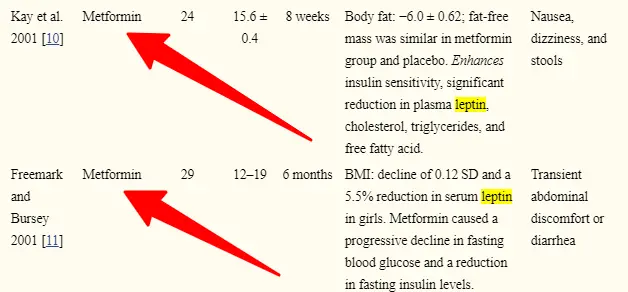
One of the main benefits of using metformin for leptin resistance is the fact that most doctors are very willing to prescribe it (even for weight loss) and that it’s very cheap.
You can pick up a $4.00 prescription for metformin from just about any pharmacy which is significantly cheaper than the $1,000 we quoted with the GLP-1 agonists.
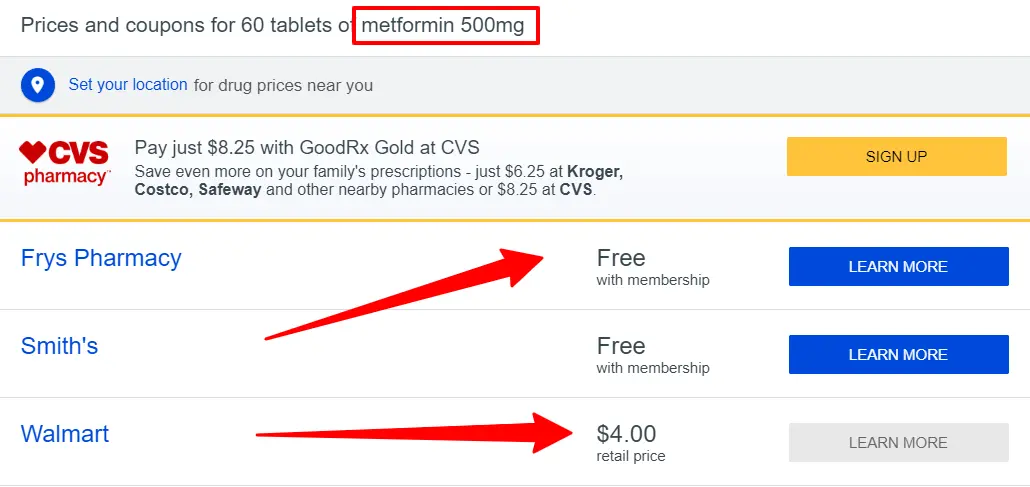
The only problem with metformin is that it’s really only effective in a select few circumstances.
By itself, it’s not a very powerful medication to treat leptin resistance.
In addition, if it’s going to help, it’s probably only going to help those with light leptin resistance (more information on how to determine where you fall below).
This means it’s largely ineffective for people with moderate to heavy leptin resistance (which may be where you fall if you are reading this).
One of the best ways to use metformin, though, is to use it in conjunction with other medications listed here.
It’s perfect if used in that scenario, but it’s often not effective if used by itself.
#3. Naltrexone
Next up on the list is a medication known as Naltrexone.
It’s quite common and well-known among people who have autoimmune diseases because it’s often used off-label to balance the immune system.
But more recently this medication has also been FDA approved for weight loss when used in combination with Wellbutrin.
The combination of these two medications is known as Contrave.
I’m not a huge fan of Contrave as a combination medication but I bring this up to prove a point.
Right off the bat that should tell you that there has been some research into this medication to suggest that it does indeed help with weight loss.
But, despite the fact that it has been recently FDA-approved for this condition, there is a high probability that your doctor has never heard of it.
How does Naltrexone help with weight loss and leptin resistance?
It’s not well understood but we do know that Naltrexone has some impact on leptin levels (9).
Some studies suggest that it helps increase leptin levels and others have shown that it may decrease them (10).
It’s not clear to me what is happening with Naltrexone and leptin levels but I can tell you from personal experience that it does seem to not only help with weight loss but also in reversing leptin resistance.
Naltrexone was originally developed to treat alcohol addiction and opioid addiction.
Even though naltrexone is a component of Contrave, I still don’t always recommend using it in conjunction with Wellbutrin.
It’s often better to use Naltrexone as an isolated medication.
The trick to getting effectiveness out of Naltrexone is to use the right dose.
Standard dosing is right around 50mg per day but for weight loss, you want to use doses that are about 1/10th of that.
The dosing in Contrave is somewhere between 8mg per day and 24 mg per day.
I find that smaller doses tend to be more effective.
#4. SGLT-2 Inhibitors
SGLT-2 inhibitors, which can be a mouthful, stand for sodium-glucose cotransporter-2 inhibitors.
These medications are FDA approved for treating type II diabetes (much like GLP-1 agonists) but have also been shown to be quite effective in promoting weight loss in patients who use them.
These medications work by preventing your kidneys from absorbing sugar in your bloodstream.
The net result is that you end up peeing out extra sugar in your bloodstream.
This works quite well for those who have high blood sugar and for those who have difficulty managing their appetite.
SGLT-2 inhibitors probably help reduce leptin resistance by directly impacting leptin sensitivity.
Some studies show that using SGLT-2 inhibitors work by reducing leptin expression in white adipose tissues (11).

So, they would theoretically work by decreasing total leptin levels which would then help sensitize your cells to existing leptin.
They probably also work to help reduce leptin resistance due to their action on insulin resistance.
I generally don’t use this class of medication unless I am dealing with someone who has fairly severe insulin resistance in addition to leptin resistance (though, these conditions do seem to go hand-in-hand).
These medications work fabulously well, especially when combined with other medications which help sensitize your body to insulin.
If you have type II diabetes or severe insulin resistance, then it would be worth exploring this class of medications for that condition alone.
But we also have many emerging studies which suggest that these medicines are also effective for weight loss as well (12).
SGLT-2 inhibitors are not as effective as GLP-1 agonists but are more effective than metformin.
This puts them somewhere in the middle in terms of effectiveness.
Unfortunately, much like GLP-1 agonists, they can also be very expensive.
The monthly cash price of Farxiga, as an example, will run right around $480.00 or so depending on where you live.
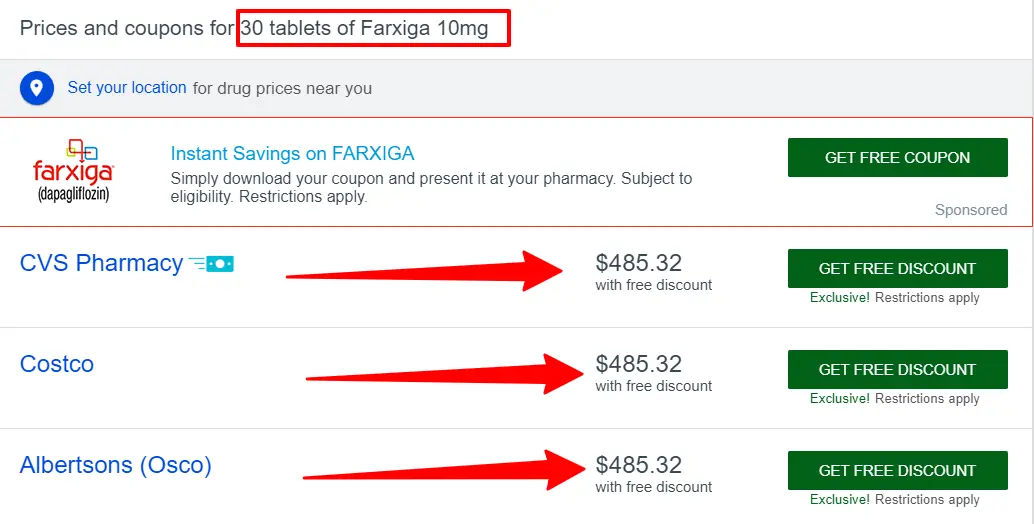
Unfortunately, some of the most effective medications are also the most expensive.
Medications that fall into this class include:
#5. Calcitonin
Last, but not least, is the medication known as calcitonin.
Calcitonin is actually a hormone produced by your thyroid gland and its primary job is to help maintain calcium levels.
But we aren’t really interested in its ability to balance your calcium. We are more interested in the fact that calcitonin is also an amylin agonist.
An agonist simply refers to the fact that something stimulates or promotes a certain function.
This can be compared to the word antagonist which does the exact opposite.
So in this setting, an amylin agonist is something that promotes the effects of amylin.
The question then becomes, what is amylin?
And amylin is a VERY important hormone secreted by the pancreas with insulin which helps to balance blood sugar, balance your appetite, and alter how fast or slow you absorb foods.
Do you see where this is going?
Calcitonin may therefore indirectly act on amylin to promote the very functions I just mentioned.
And this is why it can be used as an off-label medication to treat leptin resistance.
Much like the other medications listed here, calcitonin is not FDA approved for treating leptin levels.
Instead, it is often used to treat osteoporosis because of its effects on calcium regulation.
As I said, we don’t care about that component but we do care about the fact that it acts as an amylin agonist (13).
Calcitonin can be used as a medication in the form of salmon calcitonin.
Salmon calcitonin, derived from salmon (the fish), is similar to human calcitonin but not the exact same (14).
The result is that salmon calcitonin is about 40-50 times more powerful than human calcitonin (15).
Salmon calcitonin has been around since the ’70s and has been used for a long time to treat osteoporosis in women.
There have been some concerns over the side effects of salmon calcitonin, like the other medications listed here, but I don’t think these side effects are of huge concern.
Why?
Because your only purpose in using these medications is to reverse your leptin levels and help you lose weight.
Once you reverse this condition you can stop using the medication.
This means that you really won’t be on any of these medications long-term.

And it could easily be argued (and indeed I would make this argument), that staying 30-50 pounds overweight for 20-30 years is FAR more likely to cause harm to your body than the temporary use of these medications.
We know that obesity DEFINITELY increases your risk of heart disease, stroke, diabetes, metabolic syndrome, cancer (16), and so on.
While we know that some medications sometimes may increase your risk of certain side effects.
I would absolutely trade long-term weight loss and a definite decrease in risk in heart disease and cancer for a short-term and possible risk of various side effects related to certain prescription medications.
But the choice is up to you!
Salmon calcitonin is used as a nasal spray and runs around $30-$40 per month which makes it relatively affordable compared to some of the other medications listed above.
How do Medications Affect Leptin?
One thing that is particularly confusing for many patients is how medications impact leptin.
This often stems from a misunderstanding of how leptin works.
We know, from basic physiology, that leptin is a hormone that is supposed to INCREASE how much fat that you burn.
By this logic you might assume that high levels of leptin would be beneficial for weight loss, right?
And you would be right if that were the end of the story.
But, like always, there’s more to the story.
And the part that you are missing is the resistance component.
When your body develops a resistance to a hormone it means that it doesn’t recognize that the hormone is there even if it exists in large quantities.
In effect, it’s like the hormone doesn’t exist at all.
When you have leptin resistance and remember I believe that almost all overweight people have some degree of leptin resistance, your leptin levels will be high but you will NOT be losing weight.
This condition is known as leptin resistance.
And if your leptin levels are high but you are not losing weight then you are said to be resistant to leptin at the cellular level.
Our goal, therefore, is not to necessarily INCREASE your leptin further.
That might actually make the problem worse.
Instead, we want to decrease your leptin level slightly to help SENSITIZE your cells to the leptin that is around being produced by your body.
With this concept in mind, it should make sense now why we want to see that the medications listed above lower leptin levels.
You might think you want medication to increase your leptin level to stimulate weight loss but that actually won’t work.
In fact, we already have medications that contain leptin in them.
And guess what? They don’t work for weight loss!
And it’s precisely for the reason I stated above. More leptin, when you are already leptin resistant, will only make your resistance worse.
As you take these prescription medications you should notice a small dip in your already high leptin level.
As your leptin level dips your body should become more sensitive to the existing leptin in your serum/bloodstream and you should start to notice weight loss.
Once you regain leptin sensitivity you will want your leptin level to remain increased!
This often surprises people as they wrongly believe that high leptin is always a bad thing.
This isn’t true.
You want your body to be sensitive to leptin and for that leptin to be moderately high if you are overweight.
Just like a high leptin level with leptin resistance is a problem so too is a low leptin level.
If your leptin level drops to below 10, and you are overweight, then this will simulate the same problem as leptin resistance.
Don’t be surprised if you see fluctuations in your leptin level as you lose weight.
The severity of Leptin Resistance
Another thing you should be aware of is the severity of leptin resistance.
Leptin resistance exists on a spectrum.
On one side of the spectrum, you have light resistance.
Light resistance can probably be treated with basic diet and lifestyle modifications.
On the other side of the spectrum, you have heavy resistance.
Heavy resistance will most likely require multiple therapies and prescription medications.
Diet and lifestyle changes may help but they will most likely not be enough to reverse heavy leptin resistance.
Where you exist on this spectrum will help you determine how aggressive you need to be with your therapies and whether or not you need medication.
If you are reading this article then there is a good chance you have at least moderate leptin resistance.
How do I know?
Most likely because you’ve already tried diet and lifestyle modifications and those haven’t worked.
And if you truly had light leptin resistance then those therapies would have been enough to treat your condition.
If not, you may find yourself looking at additional therapies and options designed to help you lose weight.
The severity of your leptin resistance will depend on a number of factors.
I’ve included some of these factors below:
- A history of recurrent yo-yo dieting
- A history of rapid weight loss followed by rapid weight gain many times
- A history of thyroid disease
- A history of Hashimoto’s thyroiditis
- A history of an eating disorder
- A history of dieting starting at an early age (in your teens)
- A history of dieting over the last 20-30 years (the more times the worse your resistance will be)
- A history of eating reduced calories to maintain your weight (if you are eating 1,000 – 1,200 calories per day to maintain your weight this is a bad sign)
- A history of metabolic damage (your metabolism is slower than it should be)
The more of these factors that you have the more likely you are to have more severe leptin resistance.
The more severe your leptin resistance the more likely you are to need to be aggressive with your therapies.
You can also determine if you have severe leptin resistance by simply looking at your serum leptin level.
While there aren’t any clear guidelines to help you determine how advanced your leptin resistance is, you can use the guideline below:
- Light leptin resistance = Fasting serum leptin level between 11 and 19
- Moderate leptin resistance = Fasting serum leptin between 20 and 30
- Heavy leptin resistance = Fasting serum leptin level > 30
This should only be used as a rough guideline and not an exact guide.
I have seen patients with leptin levels in the 20’s who are incredibly hard to treat and I have seen patients with fasting leptin levels as high as 70 who shed weight very easily.
But, in general, the higher your leptin level is in the fasted state the more difficult it will be for you to lose weight.
Dosing Medications
I’ve listed several medications which all have the potential to help reverse leptin resistance.
While each of these medications has the potential to help, how much they help largely depends on how you use them.
Part of using them correctly involves using the right dose.
Dosing, while it may seem easy at first glance, is actually quite difficult in those with leptin resistance.
Well, it doesn’t have to be difficult but it should be something that you pay very close attention to.
Treating leptin resistance requires what is known as titration of your dosing.
Titration is the art of slowly increasing your dose to tune it to your individual needs.
Many patients want to hear about ‘protocols’ which is a set of guidelines or rules to follow.
There are definitely some general rules to follow but there is no rigid protocol that needs to be followed with each of the medications above.
Certain medications, especially the GLP-1 agonists, need to be dosed very carefully.
If you dose your medication too quickly then you may risk losing out on the majority of the benefit they provide.
I’ve seen a number of patients who want to lose weight so badly that they jump on the medications listed above and max out their dose on these medications in a month or two.
This is probably the worst strategy you can take.
Treating leptin resistance takes a long time and requires titration over several months.
If you increase your dose of medication too rapidly then you won’t be able to tweak it further when you hit a weight loss plateau.
You can learn more about how I recommend dosing these medications in my weight loss guide.
Additional Weight Loss Therapies
I probably sound like a broken record here but if you want to lose weight you should always layer therapies on top of each other.
If your goal is to just take something like metformin and hope it helps you lose weight without also adjusting your diet, how much you exercise, how much you are sleeping, what supplements you are taking, and so on, then it’s a lost cause.
You might see a few pounds lost here or there but you are not likely to reverse your condition or see long-lasting results.
The best approach to leptin resistance is to address as many underlying conditions as possible while simultaneously taking prescription medications.
In those with severe leptin resistance and even while doing all of these therapies you will probably notice slow weight loss over time.
But if you don’t do this, and you instead try a quick fix like the hCG diet, then you risk more long-term damage to your metabolism and difficulty with weight loss in the future.
Additional weight loss therapies may include any or all of the following:
- Dietary changes (to match your hormone imbalances and metabolic function)
- Supplements (especially those that help with fat burning, appetite suppression, or muscle building)
- Exercise routine
- Prescription medications
- Thyroid hormone
- Sex hormones (testosterone, progesterone)
- FAR IR Sauna
Conclusion
Is treating leptin resistance possible with prescription medications?
The answer is yes, but it may require you to do a little digging because many of the medications that help with leptin resistance must be used ‘off-label’.
You will also need a forward-thinking or progressive doctor to help you as these medications require a prescription from a doctor.
Do your best to match the medications listed above to the conditions that you are suffering from and you should see a reduction in your leptin and weight loss.
Now I want to hear from you:
Are you currently taking medications for leptin resistance?
Have you found success with these medications?
Have you tracked your leptin level while taking them?
Are there any other medications that you have used that weren’t listed here?
Leave your questions or comments below!
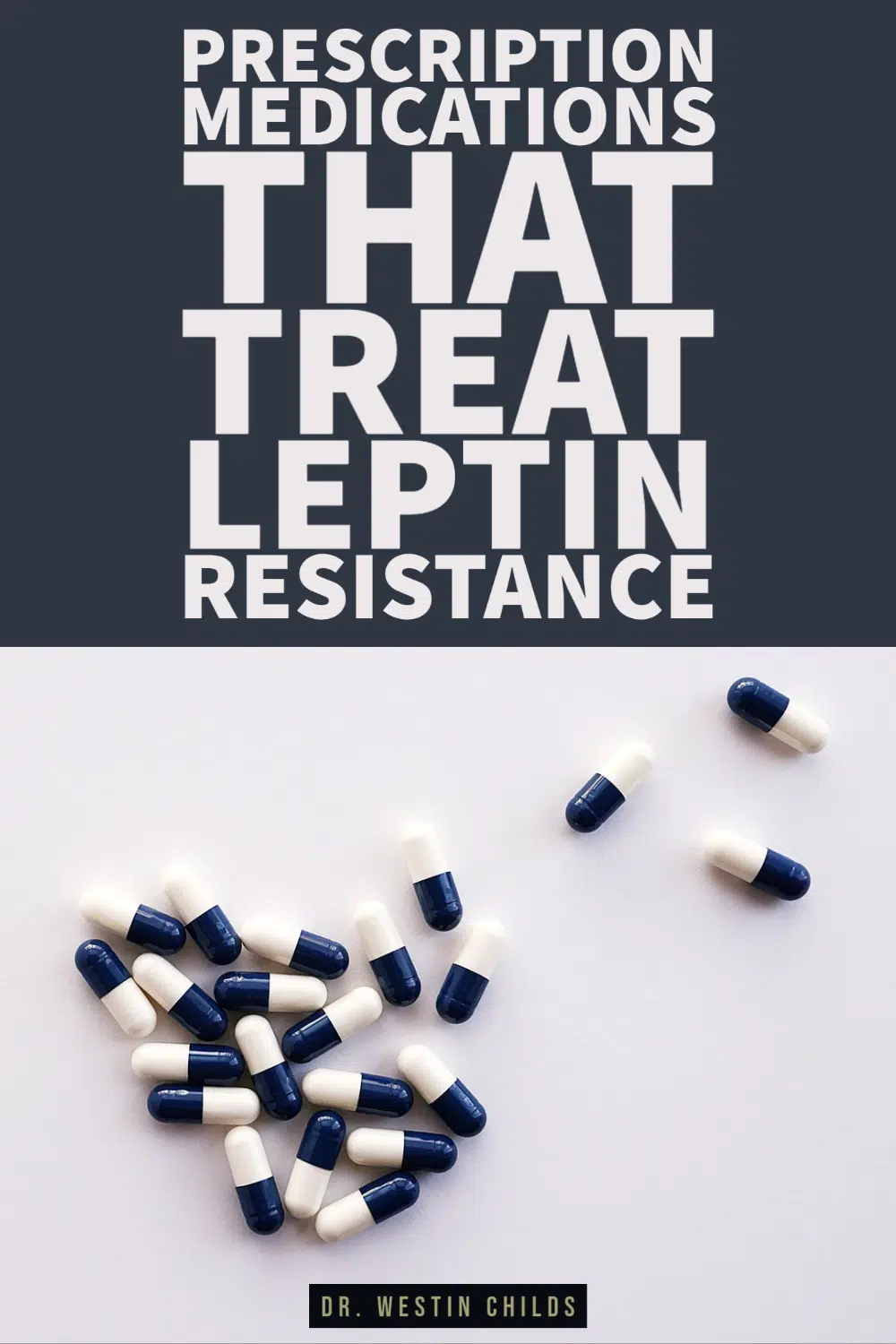
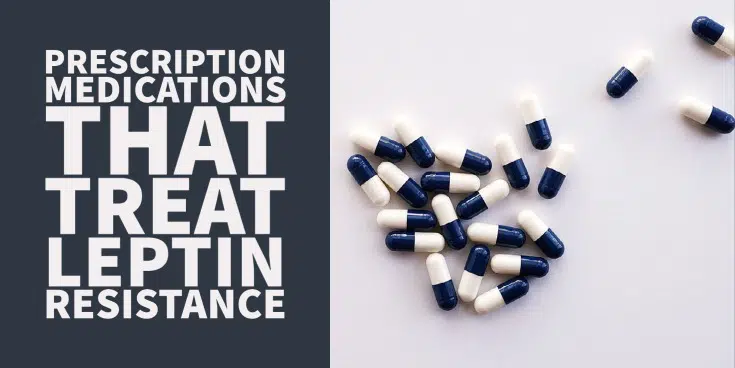

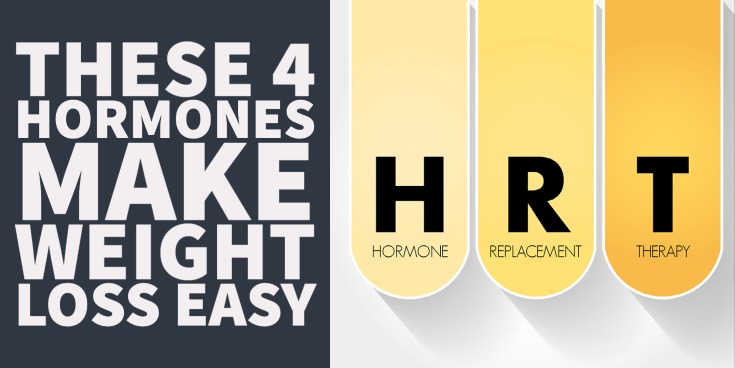





Hey boss, I am 20 yrs, old 5’7 230lbs man. been trying to lose weight for 2 yrs through bodybuilding style diets and training but can’t.
Question 1: is 20 fasting insulin very high and can it be reversed by T3 only or is it better to use saxenda as well
Question 2: my TSH is 4.22 while fT3 & fT4 are literally right in the top of the range. Is this treated by Cytomel?
Question 3: what do you think of TRT as part of treatment considering I am 20 yrs old and my test is 300 and
extras: didn’t test reverse T3 and leptin. everything else that you recommend to check for is in the optimal range. Thanks for your time in advance.
Where can I leave a detailed question including personal details, couldn’t find a place, thanks.
Hi,
My leptin is 1.9 and really low
I switched from synthroid to nature-throid (self treatment sick of being tired and endo ignoring my complaints) back in 2012. Few months ago due to my undetectable TSH (nothing new) but anxiety had to return to endo and drop nature thyroid and back on synthroid… nonetheless I have gained 30 pounds in matter of 2-3 months and it’s not stopping. I checked my leptin and found out today my leptin was way below normal, like I mentioned earlier 1.9
What treatment do you recommend for leptin deficiency? Could it be the cause of my ongoing uncontrollable hunger to this date and attributing to my weight gain in last few months?
I found a functional medicine doc in Long Island, NY who I am going to visit in two days…not sure how good she is, will post if find her helpful
Can you use more than one of these at the same time? I have struggled so long with leptin resistance-I finally want to nip it in the bud. Thank you for this article.
Hi CC,
Of course, the more resistance you have the more likely you are to need more medications/therapies/supplements.
Hi Dr. Childs,
I am not obese, but slightly overweight with a very clean/organic diet and exercise everyday, and cannot shed a single pound (slowly gaining in fact). I am on NDT and T3 to help support my sluggish thyroid, but still only weight gain or maintaining current fat levels.
My fasting insulin is low, and my random insulin (tested approx. 1 hr after a meal) is good as well; fasting leptin is very high though.
All the medications you list seem to target insulin in order to sensitize the body to leptin. Would any of these prescription meds work for me if my insulin response is good, but leptin levels indicate resistance?
Thank you
Did you ever get an answer on this? I have the same exact issue! Literally to a Tee. Can’t lose a pound to save my life.
Hi Evelyn,
Yes, there is crossover between most insulin-sensitizing medications.
How about the new Peptide therapies such as Ipomorelin, people report 60-70 pound weight loss with it, plus tons of other anti aging benefits. Is it possible that it can lower & repair leptin resistance as well? Anti aging doctor I spoke with thinks 3 month of Ipomorelin injections can rejuvenate the pituatary and address leptin resistance.
Hi M,
I’ve used them before and, in my opinion, they just don’t work very well. They have a place in certain situations but they are very expensive for the small and inconsistent results that they provide.
Hi
Can you please let me know which Leptin makes wight gain HIgh or Low
And is it safe to take the tablet to reduce wight gain
Hi Nasima,
Both high and low leptin can lead to weight gain, it’s more about your sensitivity and resistance to the leptin.
Your information has helped me so much. I found you by researching high blood pressure. Recently my BP has been a real issue. I’m pre-diabetic so have insulin issues. I have lost weight by going keto, which I suspect is at the root of my BP problem. I fit nearly all of the leptin resistance risks you listed, so I know that I am . I did lose 30 lbs on the keto diet, but must stick to it strictly or begin gaining. Again I’ve gained back what I’d lost, and am nearly back where I started. Is keto bad for people with insulin resistance? At the beginning I did notice that I had to take in a lot of fat in the form of bullet proof coffee to get into ketosis. My most recent attempts I find I can barely get above trace with the ketones and there’s a nasty ringing in my head most of the time. BP high? I’d also noticed that when my BP was high, my blood glucose was low and vice versa. I’d appreciate any insight you can offer.
Hi!
Big fan. I’ve read the majority of your website. I just started on Ozempic after finally finding a Dr that listens to me. I’m a 30 year old woman at a healthy weight for my height. The only reason I am not obese is because I eat next to nothing and over-exercise. My leptin I at 31. I find it almost impossible to lose any weight. I was wondering what I should be pairing my Ozempic with? My Dr has advised not to. I’m already on a low dose (100mg) of Wellbutrin, and have been taking T3, and 500mg of Metormin. What else of the above medications do you think will prove helpful for me? More Metformin? Naltrexone? Could I still take Wellbutrin if taking Naltrexone as I know you said that you’re not a Contrave fan? Would love to hear your thoughts and two cents! I’ve actually emailed your office a couple times. Really appreciate the help! Thank you!
Honestly – prescription meds that cost $500 – $1000 per month are realistic and affordable for exactly no one. It’s just not going to happen. Heck, the cost of your supplements are out of budget range for most of us too, if you want to get down to brass tacks.
T3, Low-Dose Naltrexone, Metformin and possibly Salmon Calcitonin from the ‘south of the border online pharmacies’ are about the only things I, and many others like me (who are either unemployed or underemployed with no insurance – thanks to the covid plandemic) will be able to afford.
I have been very tempted to purchase your non-premium version of the weight loss program, but something tells me that your menus will probably require spending $$$ at some fancy store like Whole Foods (aka Whole Paycheck for most of us), and I know I won’t be able to afford it. I can’t see making the investment in the program if I know I will probably not be able to follow it because of cost.
It would be really great if you could come up with a meal plan for 1 person that clocks in at or under $50/week at a regular grocery store, like Food Lion. That’s the ONLY WAY this is going to be feasible for much of the population that needs it the most.
Hi JJ,
I totally understand your perspective but I think you are thinking about it all wrong. There is a guarantee that being overweight will cost tens of thousands of dollars for you in the long-term including medications, procedures, doctors visits, a reduction in quality of life, early death, and so on. There is no doubt that this will happen if you are 40+ pounds overweight. It’s far better to trade a couple of thousand of dollars now to prevent those long-term complications and, in fact, will save you money in the long-term. What you choose to invest your money in, however, is none of my concern. I’m just letting you know that not looking at your health as a long-term investment is something that you will regret later.
You are right….however for those of us who just don’t have the “couple of thousand of dollars”….this is hard medicine to swallow. Thank you for being willing to address this issue-I know it is hard for all parties.
Is your new leptin supplement as effective as these medications? Or is it only for ppl with mild leptin resistance?
Hi Caroline,
Leptin treatments are meant to be stacked on one another so it can be used with all other supplements and medications.
Hello, I am a 56 year old female who has tried EVERYTHING to lose weight. My mother has type 2 diabetes as did her mother ( my grandmother) I’m 5”3 and weigh 195. My BMI IS 34. I also am on medication for high blood pressure. I spoke with my Son one day who just became a doctor and he suggested I speak with my doctor about Saxenda. Let me tell you, that my “older doctor” and pharmacist were VERY VERY reluctant to prescribe this, having heard nothing about this medication before. I had to convince her that I needed this after she suggested a dietician and the pharmacist about 5 other drugs instead. I checked with my benefit provider at work and they covered this medication so I persisted. I am now on day 3 of Saxenda and have barely an appetite whearas before I was eating double what my husband ate and then eating all night till bedtime. It’s like I was never full! I’m angry that the medical field is so resistant to helping people lose weight with medication. Obviously with hormones, stress and many other environmental issues people cannot do it on their own . I am so thankful my Son is a younger doctor who realizes and researches these drugs (off label) as well. Not everyone has an advocate on their side and I know without mentioning him in my appointment my doctor would NOT Have prescribed me SAXENDA.
Thank you so much for sharing this. This is the problem I have! Where do I find that doctor?? My current doctor accused me of being a “googeler” and told me I have have to stop researching my health problems on the internet or she would not treat me. (I am not obsessive by any means-just trying to figure out why nothing helps!) So glad you found a way!
Hello,
I have had hyopthyroidism since 2005 and recently dx with hashimoto’s in 2018 (thanks to learning from you which labs to order). I purchased your weight loss program late 2019 and began the plan Nov2019 including diet, exercise 5x/week, supplements, intermittent fasting 2 days/wk and added Saxenda (started 12/19), dosing per your instructions. In almost a year I have lost 40 pounds (slow and gradual). My labs in Sep19: TSH 1.47; T4 free .92; T3 free 4.45; HgA1C 4.1; fasting insulin 9.9. One year later Sep20 labs: TSH .697; T4 free .94; T3 free 3.53 and fasting insulin 30.3. I am baffled why my fasting insulin as gone up nearly 3x and I have been following the plan with successful weight loss. How could my insulin resistance be worse? My doctor is concerned with weight re-gain once stopping Saxenda, which I am ready to do. Thank you for your insight.
I was prescribed Saxenda by my doctor as a try it and see if it works. I was told to start on .6 and move up each week as it is only effective at 3.0. The side effects were horrific but I kept going striving for 3.0. I lost 30 lbs in 3 months and was happy but still felt the side effects. I have now been on this med for 1&1/2 years and no further weight loss. Within the last few months I have reduced my dosage on my own to 1.8 in order to stop the side effects. I am now seeing weight gain. Would you recommend taking a break ( how long) and starting over and tweaking it ? I have discussed with my new dr and he said it’s just not working for you if you have those side effects and it’s only effective at 3.0.
Hi Colleen,
I would recommend looking at this guide which outlines how I recommend using Saxenda and other weight loss medications: https://www.restartmed.com/hormone-mastery/
I am not obese but borderline overweight with BMI of only 23.7%. Doctors won’t prescribe me anything but I have tried all means to lose the 8 kg gained with HIIT workout, weight training, non-carb diet for 1.5 years but still couldn’t lose even 1kg which is abnormal for me. I had subclinical hypothyroidism but my thyroid markers went back to normal with only 25mg of levothyroxine for 3 months so I am not sure why I still can’t lose weight 1kg. What can I take to lose weight?
Hi Mythe,
I would take a look at these supplements as well as the medications and therapies listed in this article 🙂 https://www.restartmed.com/11-weight-loss-supplements-that-actually-work-with-citations/
Hello,
I’ve been on a weight loss journey for the last 4 years- through a clinic in Seattle (coming to an end due to out of state health care laws). Following very similar methods- saxenda, now ozempic, naltrexone and wellbutrin, now contrave- however am also on Janumet- which is a combo with metformin in it as I couldn’t stomach just metformin. I also take zonisimide and miglitol. My insulin resistance is under control- have lost 65lbs- still have like 30lb to go- have been stuck- my leptin is at 6, and has ALWAYS been low. It won’t budge. My hormone profile is that of someone who is anorexic, so my body only sees about 10% of me. I could eat only 500 calories and still not loose any weight. My iron is on the low side, as is my B12 (have taken B12 shots before). Side effects of ozemic and naltrexone are not wanting to eat. Kind of at a loss of what to do next.
Hi Dr Childs,
I have been struggling with leptin resistance for 3 years. I have seen many doctors, but none have been able to help me. My leptin levels are at an all time high of 40. Do you have any Dr recommendations for telemedicine or in the Seattle area that know how to treat leptin resistance?
Thank you
Hi Lianna,
Unfortunately, I do not.
Dr. Childs, just wanna state that you are AWESOME to share your
WEALTH of knowledge; appreciative; grateful to you. You ROCK
Doc! Will look for your videos on YouTube and other Social Media
platforms; confident, countless companies will want to associate
with you and that would result in the profoundly lucrative consortium;
you are deserving; all the BEST Doc!
Hi Atlas,
Glad you found the information helpful! Thanks for sharing.
Hi Dr. Childs,
Thank you for your knowledge and willingness to share it. I’m a 56-year-old woman who very suddenly and very quickly started gaining a lot of weight about 3 years ago (I gained 30 lbs in 10 weeks–it was shocking). I then put on another 20 lbs, though more slowly. Yes, I was diagnosed with Hashimoto’s disease, though my antibodies really aren’t very high and my issue is one of my T3 being too low and my RT3 being too high (my T4 and TSH are both good). At any rate, I’ve not been able to lose more than 20 lbs since this all began and I struggle to keep it off.
I’ve recently tested positive for moderate leptin resistance (the low end of moderate), but I do not have diabetes. My doctor IS willing to Rx one of the GLP-1 agonists for me but I’ve been reading about their side effects, which don’t sound too fun (nausea, severe acid reflux, gastrointestinal issues). He and I are currently considering Mounjaro or Wegovy. Do you prefer one over the other? And approximately how long does a person need to stay on these meds to balance their leptin levels? I absolutely love the idea that one of these meds could fix my leptin issues. But some of the reviews I’ve read seem to suggest people stay on these medications indefinitely, which I’m hoping to avoid. Any insight or suggestions you could offer would be greatly appreciated.
Thanks much,
Sheila
Hi Sheila,
Each person is different. I’ve seen patients use them for 3-6 months and some for 2-3 years, it just depends on the situation, how important weight loss is to that person, how responsive they are to the medications, what other therapies they are willing to undergo, and the severity of their leptin resistance.
Thanks so much for responding to my comment and questions, Dr. Childs. I so appreciate it. My understanding is that when you have leptin resistance, your brain doesn’t register that you’re full (even if your stomach feels full) so you wind up thinking about food and having terrible cravings–which you’ll likely succumb to. Because of this, my hope is that if I take Wegovy (and LDN, T3, berberine, ALA, fish oil, etc.), my leptin resistance will get fixed and my brain will respond accordingly. That is, I’ll stop having these crazy cravings and thinking about food ALL THE TIME, even when I know I’m not hungry.
What I’m confused about is that so many people say that once they go off Wegovy (and the other GLP-1 meds), their terrible cravings return. Why would this be if one of the things it does is reset your leptin resistance? I’m trying to understand.
At any rate, I’m getting ready to fill my Wegovy Rx. I’ve been nervous about it but I just spent an entire month eating no added sugar and very few grains and yet I gained another pound. There’s nothing more demoralizing than that. So I’m ready to try the medication. I’ll let you know how it goes!
Very good question and I would be interested in the answer as well! I have read about a few people who lost weight on Saxenda and then gained it back after they stopped using it. So I have been wondering lately if those drugs are to be taken long term, possibly for life? I just got a prescription for Wegovy but it is not yet available in pharmacies where I live. While waiting for it to be, I am trying to find out as much as possible about it. Wegovy seems to work even better than Saxenda and I am really hoping it will finally enable me to lose weight. It was very interesting to find another article by Dr. Childs stating that low carb diets will not lead to weight loss in insulin resistant patients if they also have leptin resistance. I have found that to be very true (no doctor willing to test my leptin levels, but low carb diets never did anything for my weight problems).
This makes me feel pretty hopeless as I fit into all the leptin resistant categories. Lifelong eating disorder with rapid weight loss followed by rapid weight regain. Well trying to lose the weight this time just made me even fatter and I’ve never struggle to lose weight this much in my life! It seems like leptin is just supposed to lower your appetite but I go hungry and my body doesn’t even seem to understand the concept of “burning calories” anymore. Sleeping/being sedentary or exercising have the same net effect on weight loss – none! Insulin resistance makes your body store fat but even if I were insulin sensitive the fat has already been stored. What am I to do? My weight doubled within just over one year and it shows no signs of improving. I’m not even that old…
Hello,
I was trying to order the GlucoSlow, but I’m not finding it on your website??
Are you out?
Thank you
Patricia K.
Hi Patricia,
I’m working on reformulating GlucoSlow Fiber so it’s not available right now but it should be in the coming months.